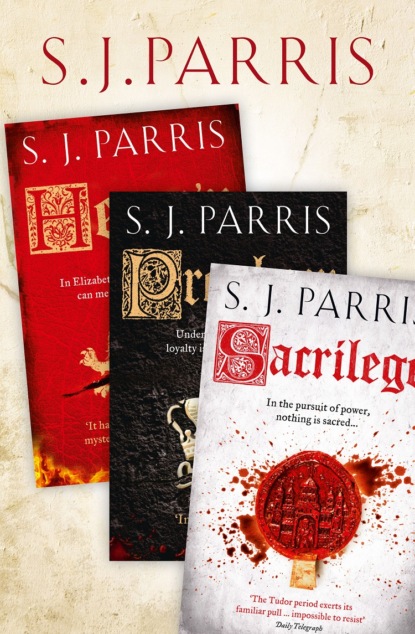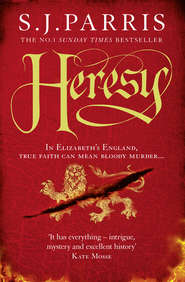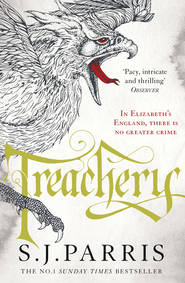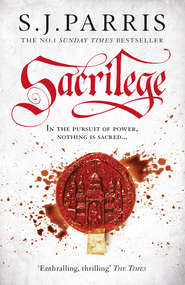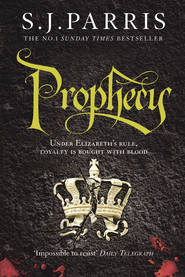По всем вопросам обращайтесь на: info@litportal.ru
(©) 2003-2024.
✖
Giordano Bruno Thriller Series Books 1-3: Heresy, Prophecy, Sacrilege
Автор
Год написания книги
2019
Настройки чтения
Размер шрифта
Высота строк
Поля
‘He’ll live,’ he said, pressing his lips together. ‘Though he’ll think twice before he tries that trick again. This road is notorious for outlaws, we should have been better prepared. You acquitted yourself well, Bruno,’ he added, turning to me in admiration. ‘Not bad for a man of God.’
‘I’m not sure God counts me as such any longer. But I did not spend three years on the run through Italy without learning to defend myself.’ I cleaned Paolo’s knife on the wet grass, thanking my old friend silently for his foresight; it was not the first time this blade had kept me from danger.
Sidney nodded thoughtfully.
‘Now that I remember – when we were in Padua, you mentioned you’d had some trouble over a fight in Rome.’ He looked at me expectantly, a half-smile hovering on his lips.
I didn’t answer immediately, turning the knife in my hands as the rain continued to course down my neck inside my collar. This was one of the darker moments in my fugitive past that I would prefer to bury. In England I wanted to be known as the eminent philosopher of the Parisian court, not the man who lived underground, pursued through Italy on suspicion of heresy and murder.
‘In Rome, someone informed the Inquisition against me for money. But I had already fled the city when his body was found floating in the Tiber,’ I said quietly.
Sidney gave a sly smile.
‘And did you kill him?’
‘The man was a notorious brawler, I understand. I am a philosopher, Philip, not an assassin,’ I replied, sheathing the knife at my belt.
‘You are not a typical philosopher, Bruno, that much is certain. Well, I will hear more of this story later. I suppose we had better find the Pole,’ he said, suppressing a sigh.
The servant I had saved was still mounted, a little way ahead of us, holding with difficulty the reins of our two horses, who were stamping and snorting, their eyes rolling back in alarm; the other servant had taken a bad blow to the head as the robbers first sprang upon us, and he had to be helped back into his saddle, where he slumped forward and clung to the horse’s neck, his eyes unfocused. Fortunately we had fought them off before they had been able to sever the straps binding the horses’ panniers, but one hung precariously from its saddle and had to be retied before we could continue. We found the palatine cowering under a tree around the next bend; Sidney muttered an apology for the brutal interruption, though I could not help thinking that it was the Pole who should be apologising for his cowardice.
We rode on, bruised and bedraggled; though the cut on my thigh was only shallow, it stung as the wet cloth of my breeches chafed against it. I was more deeply shaken by the attack than I cared to let Sidney see; though it was true that my eventful past had taught me how to keep my wits in a fight, I had spent the past year in soft living at King Henri’s court, and my reactions felt slow and unpractised. The water drove relentlessly down my neck and into my eyes, and even when we reached the brow of Shotover Hill, which Sidney said should have afforded us a magnificent view over the city of Oxford, the curtain of rain all but obscured it from sight.
We descended towards the bridge that crossed the river by the College of St Mary Magdalen and saw that a small crowd had gathered there; as we drew closer Sidney announced that this was the delegation of university dignitaries and aldermen waiting to greet us. A rider had gone out from Windsor that morning to notify those preparing for the palatine’s visitation that we would not now be arriving by river, but so much of the road had become waterlogged that our progress had been slow, and it seemed the poor welcoming party had been waiting for us for some time in the rain, which now dripped from their velvet caps and the sleeves of their black and scarlet gowns.
The vice-chancellor stepped forward and introduced himself, bowing low and kissing first the palatine’s bejewelled hand and then Sidney’s; I saw his eyes widen at our bruised and dishevelled appearance, but he graciously made no mention of it. He explained that they would be guests at Christ Church College, the grandest of all the Oxford colleges and the one for which the queen herself had special charge; Sidney had himself been an undergraduate at Christ Church, so it was natural that he should return there. I was to be lodged separately, and here a round-faced, balding man stepped forward and extended his hand to me in the English fashion as he tried stoically to ignore the water streaming from the peak of his hat.
‘Doctor Bruno – I am John Underhill, Rector of Lincoln College. You are most welcome to Oxford and I hope you will do us the honour of accepting our hospitality at the college.’
‘Thank you, I am very grateful.’
‘You and I are to be adversaries in the disputation tomorrow night and will face each other across the floor of the Divinity School, but I hope that, until then, we may regard one another as friends.’ He smiled as he said this, but it died quickly on his lips.
So this was my Aristotelian opponent. He had a fussy air and there was something brittle about his expression of hospitality, but I was determined to make a good impression in Oxford, so I smiled broadly and shook his proffered hand.
‘I certainly hope so too, Doctor Underhill.’
We entered the city through the East Gate, a small barbican in the high walls that encircled the main body of the town, and as we passed under its battlements so a concert of musicians struck up, their instruments sounding bravely through the noise of rain and wind. The palatine roused himself from his sulk just enough to wave unenthusiastically as our party progressed along the High Street past rows of little timber-framed houses, which gave way as we neared the centre to the ornate blond stone façades of one or other of the colleges. Outside these stood groups of students of all degrees, decked out in their formal dress and shivering as they huddled under the eaves to salute us as we passed, flanked by the doctors and aldermen. At length we came to a halt beside a narrow street that turned off to the north, where I was informed I would depart with the rector. After I had dismounted and handed the care of my horse to a young groom, to be taken to the rector’s private stables, I walked across to Sidney, who reached down and clasped my hand.
‘I shall see you tomorrow for your moment of glory, Bruno,’ he said, smiling. ‘Do not let anything throw you off the scent – but spare a charitable thought for me at dinner.’ He nodded in the direction of the palatine, who was complaining loudly to one of the university officials about the advanced state of his saddle-sores. I would not be sorry to lose his company, though I was disappointed to be separated from Sidney. Tonight, however, I wished only to retire early and prepare myself for the public debate and knew I would not be best disposed for company; once the disputation was over and I had acquitted myself as best I could, I would be able to relax and enjoy the convivial atmosphere of the college hall, and turn my attention to my other missions.
The rector stood at the entrance to the narrow lane, his robe drenched, but smiling resolutely. I pulled up the collar of my cloak as we made our way along between buildings for a few yards, until the wall on our left rose up into a squat rectangular tower of that same buttery yellow stone. The rector pushed open a smaller wooden door the height of a man set into the heavy iron-studded timber of the high arched gateway and held it for me to pass through, followed by the servant who carried my bag.
‘I’m afraid that here I must relieve you of your dagger, Doctor Bruno,’ he said, apologetically, lowering his eyes to the sheath at my side. ‘It is one of the first laws of Oxford that no man may carry weapons within the university precincts. We must have a care for our young men’s persons as well as their minds and souls. Don’t worry, we will keep it quite safe for you.’ He gave a self-conscious laugh as I reluctantly unstrapped the knife and handed it over.
I stepped past him through an archway that led beneath the tower to a neat quadrangle paved with stone flags. The buttressed range immediately opposite the gatehouse tower I guessed to be the college’s hall, by its high mullioned windows and the smoke louvre in the centre of the roof. Ivy grew along the stonework there, though not on the ranges to my right and left. At the corners of each range in the quadrangle an archway led to a narrow passage. The rector appeared beside me and took off his sodden hat, passing a hand across his shiny pate.
‘Forgive my appearance, Doctor Bruno – this sudden regression to winter has taken us all by surprise, and just as we thought summer on its way. But that is what you must expect in England, I’m afraid. You must long for the blue skies of your native land.’
‘At times, though I must say that I find the weather of northern Europe suited to my temperament,’ I replied.
‘Ah. You are of a melancholy humour, then?’
‘Like all of us, Doctor Underhill, I am a mixture of contradictory elements. Equal parts earth and fire, melancholy and choler, I fear. But it is more that warmth and blue skies stir the blood, do you not think? I find it easier to write when I am not tempted to other pursuits.’
Underhill nodded doubtfully; he had the expression of a man whose blood had not been stirred in many years.
‘You are right, it is hard to bend the students to study during the summer months. Now – I have arranged a room for you in the south range, where you will be adjacent to my own residence.’ Here he waved a hand at the mullioned bay windows next to the hall. ‘And directly opposite, across the quad, you will find our very fine library, which you must feel free to make use of at any time.’
‘Have you many books?’ I asked, shaking the water from my cloak.
‘Some of the finest of any college,’ he said, swelling with a pride I could forgive, since it was on behalf of his manuscripts. ‘Largely works of scholastic theology, but the nephew of our founder, Dean Flemyng, left as a bequest to the college a remarkable collection of literary and classical texts, many of which he copied in his own hand. He studied in Italy, you know, and brought many manuscripts back from the corners of Europe at the end of the last century,’ he added.
‘Really? I should very much like to see your collection,’ I said, my pulse quickening. ‘Do you know if Dean Flemyng visited Florence at all during his travels? Around the 1460s?’
The rector gave a little swagger with his shoulders. ‘He certainly did – a number of books in our collection bear the inscription of the great Florentine bookseller Vespasiano da Basticci, dealer to Cosimo de’ Medici, as I’m sure you know. Does this period particularly interest you?’
I took a deep breath, trying to keep my face neutral, and clasped my hands together so that their trembling would not betray my excitement.
‘You know, every Italian scholar must be fascinated by Cosimo’s library – at that time he had envoys travelling through all Europe and the Byzantine empire in search of undiscovered texts to augment his collection. I knew a descendant of Vespasiano once, in Paris,’ I added lightly. ‘I should be extremely interested to see which of these rare treasures Dean Flemyng brought back to Oxford with him, if I may.’
Was it my imagination, or did the rector look slightly uncomfortable?
‘Well, you must ask Master Godwyn, our librarian, to show you the collection – he will be delighted to share his knowledge, I’m sure. But for now you must be longing to change your clothes and take supper. And if you want to have a shave first –’ here he cast a critical eye over my hair and beard – ‘we have a barber in the college. The porter will let you know where to find him. Usually the senior Fellows and I dine in hall with the undergraduates, but it is a noisy affair and for your first evening in Oxford I thought you might prefer something more sedate. Therefore I would like to invite you to join my family and a few select guests to dine in my own lodgings, which you see there next to the hall, abutting the south range.’
‘Your family?’ I said, surprised. ‘You are not a bachelor, then?’
‘We are no longer a community of clerics here in Oxford, Doctor Bruno,’ he said with a modest laugh. ‘Priests of the Church of England may marry – in fact, Her Majesty positively encourages them to do so, to further distinguish themselves from those of the Roman faith – and likewise for the heads of colleges here, though I admit we are still very much in the minority. I suspect it is not a life to tempt many wives – university society is somewhat limited for ladies – but my dear Margaret is a rare woman and professes to have been happy enough here these past six years, excepting …’ Here he broke off and it was as if a cloud passed over his face, before he resumed, in a lighter tone. ‘She does not dine with us in hall, according to the regulations, so she is always delighted to be able to entertain guests in our own rooms. I shall go now and tell her you are arrived, and call a servant to show you to your room. Perhaps in an hour you would like to make your way over – just go through that right-hand archway beside the hall and you will see a wooden door off the passage.’
We had no sooner moved out from the shelter of the gatehouse arch to venture through the rain across the quadrangle than we were interrupted by an urgent cry.
‘Rector! Rector Underhill – wait, I pray you!’
From the north side of the quadrangle a figure was running towards us, a tattered black scholar’s gown fluttering behind him, with a paper in his hand which he brandished as if there were some imminent emergency. I noticed the rector’s face set tight for a moment in annoyance. The young man slid to a halt in front of us on the wet flagstones and I saw that he was perhaps twenty years of age, and very shabbily dressed, his shirt and breeches patched and his shoes thin and worn through at the toe. He looked from me to the rector with an expression of great anxiety and said, breathlessly,
‘Rector Underhill, is this your esteemed visitor from the court? I beg you, give me leave to speak to him.’
‘Thomas,’ the rector looked supremely irritated, ‘this is neither the time nor the place. Kindly show some decorum before our guest.’
To my surprise, the boy then turned to me, dropped to his knees there on the wet ground and clutched the hem of my cloak in one hand, pressing his scrap of paper into my hand with the other.
‘My lord, I beseech you, take pity on one whom God has forgotten. Give this letter to your uncle, I beg of you, and ask him to pardon my poor father and let him return, please, my lord, if you have any Christian compassion, grant me this favour and take his suit to the earl, tell him Edmund Allen repents of his sins.’
There was a wildness in his eyes, and his evident distress moved me. Guessing his misunderstanding. I laid a hand gently on his head.
‘Son, I would gladly help, but my uncle was a stonemason in Naples, I cannot imagine he would be much use to you. Come.’ I took his hand and helped him to his feet.
‘But …’ He started at my accent, then his face reddened violently and he looked at me in an anguish of confusion as he realised his mistake. ‘Oh. I beg your pardon, my lord. You are not Sir Philip Sidney?’





